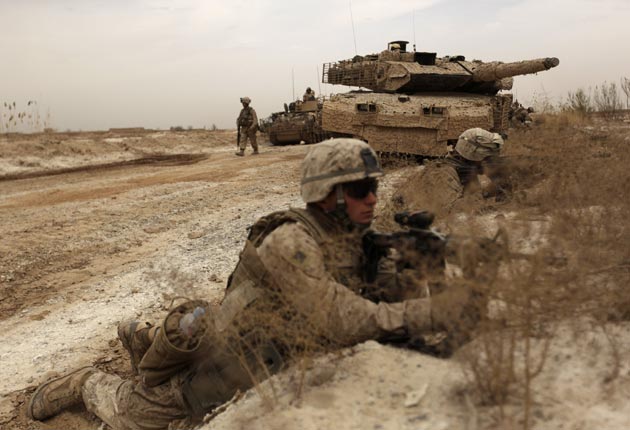Food and water runs out for Marjah civilians
For Afghans who didn't get out before Operation Moshtarak began, the attack is taking its toll. Kim Sengupta reports from Helmand

Your support helps us to tell the story
From reproductive rights to climate change to Big Tech, The Independent is on the ground when the story is developing. Whether it's investigating the financials of Elon Musk's pro-Trump PAC or producing our latest documentary, 'The A Word', which shines a light on the American women fighting for reproductive rights, we know how important it is to parse out the facts from the messaging.
At such a critical moment in US history, we need reporters on the ground. Your donation allows us to keep sending journalists to speak to both sides of the story.
The Independent is trusted by Americans across the entire political spectrum. And unlike many other quality news outlets, we choose not to lock Americans out of our reporting and analysis with paywalls. We believe quality journalism should be available to everyone, paid for by those who can afford it.
Your support makes all the difference.As desperate residents of Marjah warned that food and water were running out yesterday, the Operation Moshtarak endgame got under way with Nato and Afghan government forces attempting to force their way into one of the last remaining Taliban enclaves.
The need for supplies in the former Taliban stronghold is becoming increasingly urgent for those who did not leave town when the fighting began. But for now, the US-led troops are focused on what they hope will be a final battle with the insurgents in the town, who repeatedly attempted to block their path yesterday.
The coalition faced ambushes among the narrow alleyways and roadside bombs on the edges of a two-square-mile stretch on the western edge of the combat zone. Warplanes, helicopter-gunships and unmanned drones circled above, but were being used only sparingly because, US commanders claimed, the militants were using civilians as shields.
Lt-Col Brian Christmas, commander of 3rd Battalion, 6th Marine Regiment, said: "They are squeezed. It looks like they want to stay and fight, but they can always drop their weapons and slip away."
Around 600 Afghan policemen from the Public Protection Force, the newly established gendarmerie, were waiting to move into the remainder of Marjah, as the projected first step towards establishing Afghan government control. General Mohieddin Ghouri, the head of the Afghan army in Helmand province, said: "They are in Marjah centre, in the bazaar. We are busy carrying out the clean-up and search operations" with a view to eventually setting up police posts there.
But despite that progress, Western officials face a major humanitarian problem in the aftermath of the assault – a time that US Nato commander General Stanley McChrystal has predicted will be far more challenging than the fighting phase.
Marjah residents, speaking on the telephone, described the hardship they faced. Abdul Ghias, 53, said, "Most people cannot get hold of medicine or food, and people cannot work their farms." Yaqub Rashid, a shopkeeper, said: "We are too scared to go out because of all the firing going on. We were also worried about stepping on bombs that have been planted. Neighbours are sharing food with each other, but we are now facing a problem. Many of us did not run away and stayed behind to protect our homes. But we need help."
There has been a massive airlift of food, water and fuel to areas recaptured from the Taliban, with the British Joint Helicopter Force based at Camp Bastion moving around 100 tonnes of supplies for troops and civilians.
The commanding officer, Lt-Col Mike Smith, said: "After the insertion of forces, we have had to ensure that there was an uninterrupted flow of supplies. We have also helped with infrastructure building, such as dropping a bridge over a canal in the Nad-e-Ali area."
He added that an absence of resistance on the ground was making the process easier. Last week, Maj-Gen Nick Carter, the British commander of Isaf (International Security and Assistance Force) in the south of the country, said it would take around 30 days to clear insurgents from targeted areas. Twelve Nato soldiers and between 15 and 21 civilians have died.
Join our commenting forum
Join thought-provoking conversations, follow other Independent readers and see their replies
Comments